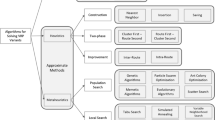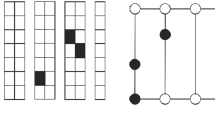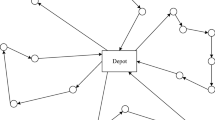Abstract
Most classical scheduling models assume a job is delivered to a customer immediately after job processing is complete. In numerous practical situations, however, multiple delivery dates exist, and the time interval between any two consecutive delivery dates is constant. A finished job is supplied to a customer by truck on the earliest date in a series of fixed delivery dates, typically at or after processing is complete. This fixed delivery strategy results in substantial cost savings when delivery is expensive or complex. The goal of this study is to minimize the sum of due-date cost and earliness penalty associated with jobs scheduling in a dynamic job shop environment. The due date cost for a job is incurred for time spent delivering a job to a customer. Earliness penalty is incurred if a job is completed before the delivery date. This study identifies three dispatching rules, and proposes nine new rules by explicitly considering different due date costs per time unit and the earliness penalty per time unit of a job. The proposed rules are simple and easily implemented without preliminary runs for parameter estimation. Simulation results show that the proposed dispatching rules are significantly superior to their counterparts.
Similar content being viewed by others
Abbreviations
- J :
-
Set of jobs, \( J = \left\{ {J_{1} ,\;J_{2} ,\; \ldots ,\;J_{n} } \right\} \)
- M :
-
Set of machines, \( M = \left\{ {M_{1} ,\;M_{2} ,\; \ldots ,\;M_{m} } \right\} \)
- \( N_{i} \) :
-
Number of operations in job i
- \( A_{i} \) :
-
Arrival time of job i
- \( P_{ij} \) :
-
Processing time for operation j of job i
- τ :
-
Length of each delivery interval
- \( C_{i} \) :
-
Completion time of job i
- α :
-
Due date cost per unit time of job i
- β :
-
Earliness penalty per unit time of job i
- \( TC_{i} \) :
-
Total cost of job i
- \( C_{i,j - 1} \) :
-
Completion time of the previous operation (i.e., operation j − 1) of job i
- \( RP_{ij} \) :
-
Remaining processing time required to complete job i after operation j
- \( T_{now} \) :
-
Time instant at which dispatching decision is made
- \( Z_{i} \) :
-
Priority index of job i at instant T now
- λ :
-
Number of completed deliveries
- R :
-
A ratio of the achieved rate to the next delivery date
- \( G_{1} \) :
-
Set of jobs whose current operation is the final operation
- \( G_{2} \) :
-
Set of jobs whose current operation is not the final operation
- \( P_{ij}^{(1)} \) :
-
Processing time of operation j of the first job in Set G 1
References
Chand S, Chhajed D, Traub R (1994) A single-machine scheduling model with fixed-interval deliveries. Prod Oper Manag 3(4):296–307
Chhajed D (1995) A fixed interval due-date scheduling problem with earliness and due-date costs. Eur J Oper Res 84(2):385–401
Fu B, Huo Y, Zhao H (2012) Coordinated scheduling of production and delivery with production window and delivery capacity constraints. Theoret Comput Sci 422:39–51
Hall NG, Lesaoana M, Potts CN (2001) Scheduling with fixed delivery dates. Oper Res 49(1):134–144
Lee C-Y, Li C-L (1996) On the fixed interval due-date scheduling problem. Discrete Appl Math 68(1–2):101–117
Lesaoana M (1991) Scheduling with fixed delivery dates. Ph.D. Thesis, University of Southampton
Matsuo H (1988) The weighted total tardiness problem with fixed shipping times and overtime utilization. Oper Res 36(2):293–307
Wang X, Cheng TCE (2012) Performance bound analysis of a heuristic for the total weighted flowtime problem with fixed delivery dates. Comput Ind Eng 62(2):451–456
Author information
Authors and Affiliations
Corresponding author
Rights and permissions
About this article
Cite this article
Liu, CH., Hsu, CI. Dynamic job shop scheduling with fixed interval deliveries. Prod. Eng. Res. Devel. 9, 377–391 (2015). https://doi.org/10.1007/s11740-015-0605-z
Received:
Accepted:
Published:
Issue Date:
DOI: https://doi.org/10.1007/s11740-015-0605-z




